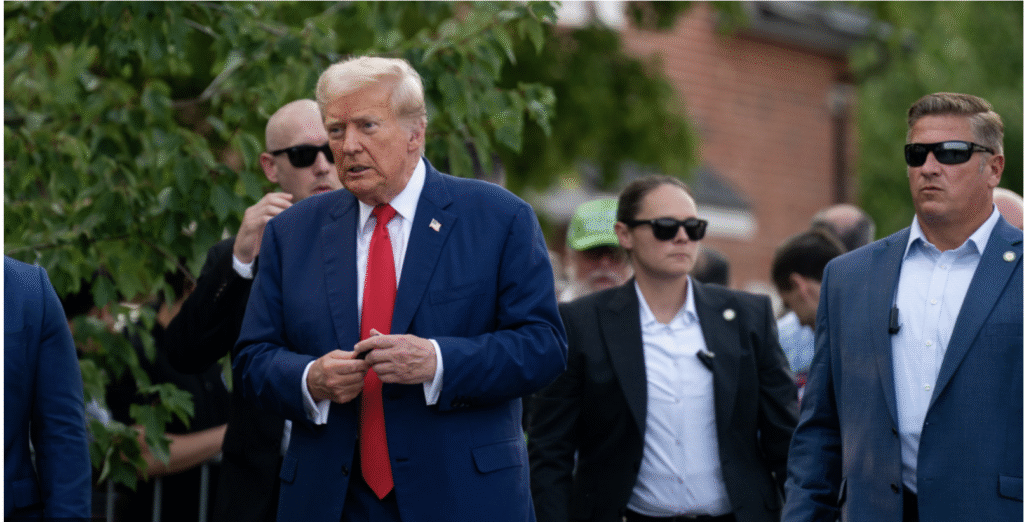
“A Surge in Patriotism or a Wake-Up Call? The Secret Service Rebuilds After the Butler Incident”
In an unprecedented shift that reflects both a renewed interest in law enforcement and the aftermath of a national security breach, the United States Secret Service is experiencing a historic surge in applications. According to the Department of Homeland Security (DHS), applications for Secret Service agent positions have skyrocketed by 214 percent compared to the same period last year. Between January 20 and May 1, 2025, more than 22,000 individuals submitted applications—up from approximately 7,000 during the same timeframe in 2024.
This remarkable influx is more than a numerical change; it is a symbol of shifting public sentiment, a reflection of internal reforms, and a direct response to a traumatic and widely publicized failure of protection at a campaign rally in Butler, Pennsylvania.
The Catalyst: A Breach at Butler
On July 13, 2024, then-presidential candidate Donald Trump survived an assassination attempt during a rally in Butler, Pennsylvania. A lone gunman opened fire from a rooftop that was shockingly within the line of sight of the stage. The attack claimed the life of Corey Comperatore, a rally attendee, and injured James Copenhaver and David Dutch—two others who were in the crowd.
While Trump survived the attack with minor injuries, the attempt revealed a glaring vulnerability in a security apparatus considered among the best in the world. An independent review panel was immediately convened to investigate the events leading up to the incident. Its findings, released in early 2025, were damning.
The panel’s report identified “numerous mistakes”, not only in the immediate handling of the rally but also in systemic flaws within the Secret Service itself. Perhaps most alarming was the panel’s warning that without serious and urgent reform, “another Butler can and will happen again.”
Systemic Failures and Cultural Decay
The panel didn’t mince words. It found what it called a “troubling lack of critical thinking” among Secret Service agents and a “corrosive culture” that undermined decision-making and risk management. The organization was further criticized for lacking clear lines of responsibility and for demonstrating a lax attitude toward resources and strategic planning.
It noted that personnel assigned to Trump’s detail lacked sufficient field experience and that leadership had failed to carry out proper reconnaissance and surveillance at the Butler site. The rooftop from which the gunman fired had no security presence, despite being an obvious vantage point—a fundamental oversight that experts called “unforgivable.”
According to the report, these were not isolated issues but rather foundational problems that had taken root over a period of time. The culture within the Secret Service had drifted away from its “core protective mission,” and unless that culture was addressed, the organization would continue to put national leaders at risk.
The Trump Administration’s Role
The DHS didn’t hesitate to assign part of the blame to the prior administration. A spokesperson stated that the Trump administration had “demoralized and denied resources” to law enforcement agencies, including the Secret Service. This, the department argued, contributed to the erosion of standards and capabilities within the agency.
“President Trump himself nearly lost his life because of it,” the spokesperson told Fox News Digital. “Now, after reforming the Secret Service and providing it with the resources it needs to do its job, we are seeing a historic surge in applications. Americans naturally want to protect and serve. We simply have to let them.”
The implications of this statement are significant. They suggest that both the erosion and the rebuilding of the Secret Service are politically charged topics, and that leadership matters not just in policy, but in morale, standards, and institutional focus.
Reform, Recruitment, and Redemption
In the wake of the Butler incident and the damning report that followed, the Biden administration moved swiftly to begin reforming the Secret Service. A new director with experience in both military operations and civilian law enforcement was appointed, and sweeping changes in hiring, training, and oversight were introduced.
This effort to rebuild the agency appears to be working—not just in numbers, but in quality.
Tim Miller, a former Secret Service agent and Marine Corps officer, told Fox News that the agency is “returning to the core mission and the standards that made it great.” He emphasized that a more mission-focused culture is attracting top-tier candidates, many of whom are experienced in military or law enforcement.
“When I got hired,” Miller said, “I had been a Marine Corps officer and a police officer—it was a high standard to get in. I think many now want to be one of the best of the best, and the Secret Service is trying to get back to that gold standard.”
This shift has energized a new generation of candidates, many of whom are motivated by patriotism, a sense of justice, and a desire to restore integrity to an organization that once symbolized elite protection and national pride.
A Dangerous World Demands Excellence
The world has changed dramatically in the past decade. Domestic extremism is rising. Political polarization has led to increased threats against public officials. Cybersecurity and surveillance capabilities have become more complex. In this volatile climate, the role of the Secret Service is more critical than ever.
Historically, the Secret Service was created in 1865 to combat counterfeiting, and it wasn’t until 1901—after the assassination of President William McKinley—that its mission expanded to presidential protection. Over the years, it has evolved into a multi-faceted organization tasked with protecting not only the President and Vice President, but also visiting dignitaries, presidential candidates, and the families of high-ranking officials.
With so much at stake, excellence cannot be optional.
The recent increase in applicants is encouraging, but as the panel noted, quality matters far more than quantity. If the agency is to reclaim its place as the world’s premier protective service, it must vet and train agents to the highest standards possible.
Public Trust and Accountability
The Butler incident shook public confidence in the Secret Service, and rightly so. When the most visible public figure in the country can be targeted in broad daylight while surrounded by federal protection, it suggests a failure that goes far beyond poor planning.
But public trust can be regained—and in many ways, the surge in applications is a sign that Americans are ready to be part of the solution. These are people willing to put themselves on the front lines, ready to make a difference. The agency’s ability to harness that momentum while implementing real reform will define its trajectory for decades to come.
The panel’s recommendations—ranging from structural reorganization to cultural retraining—must be acted upon, not shelved. Leadership must be held accountable, and future incidents must be prevented not by luck, but by design.
Honoring the Fallen
Lastly, it is important to remember that the cost of the Butler failure was not abstract. Corey Comperatore lost his life. His family, along with those of the injured, will carry the weight of that day forever. The panel dedicated its report to them—not just as a gesture of respect, but as a sobering reminder of what is at stake.
The surge in Secret Service applications is a hopeful sign, but it must be backed by real transformation. The sacrifice of those affected by the Butler shooting should serve as a guiding light—not just for the agency, but for the country as a whole.
We often say that freedom isn’t free. Protecting democracy, safeguarding our leaders, and defending our institutions requires vigilance, integrity, and courage. The Secret Service now has a second chance to rise to that challenge—and the nation is watching.


